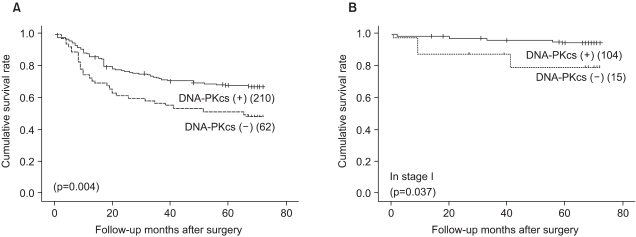Cancer Res Treat.
2005 Apr;37(2):98-102.
Loss of DNA-dependent Protein Kinase Catalytic Subunit (DNA- PKcs) Expression in Gastric Cancers
- Affiliations
-
- 1Department of Pathology, Seoul National University Bundang Hospital, Seoul National University College of Medicine, Seongnam, Korea. gychoe@plaza.snu.ac.kr
- 2Deparments of Pathology, Seoul National University College of Medicine, Seoul, Korea.
- 3Deparments of Surgery, Seoul National University College of Medicine, Seoul, Korea.
- 4Cancer Research Institute, Seoul National University College of Medicine, Seoul, Korea.
Abstract
- PURPOSE
DNA-PKcs is one of the DNA repair genes. It was recently found that hyperplasia and dysplasia of the intestinal mucosa and the production of aberrant crypt foci were developed in DNA-PKcs-null mice, and this suggests a suppressive role for DNA-PKcs in tumorigenesis. MATERIALS AND METHODS: To investigate the possible relationship between the clinico-pathologic characteristics and the survival of gastric cancer patients, the expression status of DNA-PKcs was determined in 279 consecutive gastric cancers. Immunohistochemical analysis was performed to evaluate the expression levels of DNA-PKcs protein by using the tissue array method. RESULTS: Out of 279 consecutive gastric cancers, 63 cases (22.6%) showed the loss of DNA-PKcs expression. The loss of DNA-PKcs expression was significantly associated with advanced cancer (p <0.001), lymphatic invasion (p=0.001), lymph node metastasis (p=0.009), and advanced pTNM stage (p=0.009). Univariate survival analysis revealed that patients with the loss of DNA-PKcs expression had significantly poorer survival than those patients with intact DNA-PKcs expression (p=0.004). Moreover, the loss of DNA-PKcs expression was identified to correlate with a lower survival in the subgroup of stage I gastric cancer patients (p=0.037). CONCLUSION: The loss of DNA-PKcs expression was found in 23% of human gastric cancers and this was identified to significantly correlate with poor patient survival, especially for stage I gastric cancer patients.
MeSH Terms
Figure
Reference
-
1. Ramsden DA, Gellert M. Ku protein stimulates DNA end joining by mammalian DNA ligases: a direct role for Ku in repair of DNA double-strand breaks. EMBO J. 1998; 17:609–614. PMID: 9430651.
Article2. Chan DW, Lees-Miller SP. The DNA-dependent protein kinase is inactivated by autophosphorylation of the catalytic subunit. J Biol Chem. 1996; 271:8936–8941. PMID: 8621537.
Article3. Suwa A, Hirakata M, Takeda Y, Jesch SA, Mimori T, Hardin JA. DNA-dependent protein kinase (Ku protein-p350 complex) assembles on double-stranded DNA. Proc Natl Acad Sci USA. 1994; 91:6904–6908. PMID: 8041718.
Article4. Yaneva M, Kowalewski T, Lieber MR. Interaction of DNA-dependent protein kinase with DNA and with Ku: biochemical and atomic-force microscopy studies. EMBO J. 1997; 16:5098–5112. PMID: 9305651.
Article5. Hammarsten O, Chu G. DNA-dependent protein kinase: DNA binding and activation in the absence of Ku. Proc Natl Acad Sci USA. 1998; 95:525–530. PMID: 9435225.
Article6. Kurimasa A, Ouyang H, Dong LJ, Wang S, Li X, Cordon-Cardo C, et al. Catalytic subunit of DNA-dependent protein kinase: impact on lymphocyte development and tumorigenesis. Proc Natl Acad Sci USA. 1999; 96:1403–1408. PMID: 9990036.
Article7. Rigas B, Borgo S, Elhosseiny A, Balatsos V, Manika Z, Shinya H, et al. Decreased expression of DNA-dependent protein kinase, a DNA repair protein, during human colon carcinogenesis. Cancer Res. 2001; 61:8381–8384. PMID: 11731412.8. American Joint Committee on Cancer. AJCC cancer staging manual. 2002. 6th ed. New York: Springer-Verlag.9. International Agency for Research on Cancer (IARC). World Health Organization Classification of Tumors; pathology and genetics of tumors of the digestive system. 2000. Lyon: IARC Press.10. Lee HS, Lee HK, Kim HS, Yang HK, Kim YI, Kim WH. MUC1, MUC2, MUC5AC, and MUC6 expressions in gastric carcinomas: their roles as prognostic indicators. Cancer. 2001; 92:1427–1434. PMID: 11745219.11. Darwish NS, Kim MA, Chang MS, Lee HS, Lee BL, Kim YI, et al. Prognostic significance of CD24 expression in gastric carcinoma. Cancer Res Treat. 2004; 36:298–302.
Article12. Lindahl T. Jackson SP, editor. Genetic instability in cancer. DNA damage detection by DNA dependent protein kinase and related enzymes. 1996. New York: Cold Spring Harbor Laboratory Press;p. 261–279.13. Dynan WS, Yoo S. Interaction of Ku protein and DNA-dependent protein kinase catalytic subunit with nucleic acids. Nucleic Acids Res. 1998; 26:1551–1559. PMID: 9512523.
Article14. Loeb LA. Mutator phenotype may be required for multistage carcinogenesis. Cancer Res. 1991; 51:3075–3079. PMID: 2039987.15. Mayo LD, Turchi JJ, Berberich SJ. Mdm-2 phosphorylation by DNA-dependent protein kinase prevents interaction with p53. Cancer Res. 1997; 57:5013–5016. PMID: 9371494.16. Lees-Miller SP, Godbout R, Chan DW, Weinfeld M, Day RS 3rd, Barron GM, et al. Absence of p350 subunit of DNA-activated protein kinase from a radiosensitive human cell line. Science. 1995; 267:1183–1185. PMID: 7855602.
Article17. Noguchi Y, Yoshikawa T, Tsuburaya A, Motohashi H, Karpeh MS, Brennan MF. Is gastric carcinoma different between Japan and the United States? Cancer. 2000; 89:2237–2246. PMID: 11147594.
Article18. Blunt T, Gell D, Fox M, Taccioli GE, Lehmann AR, Jackson SP, et al. Identification of a nonsense mutation in the carboxyl-terminal region of DNA-dependent protein kinase catalytic subunit in the scid mouse. Proc Natl Acad Sci USA. 1996; 93:10285–10290. PMID: 8816792.
Article19. Cho NH, Cordon-Cardo C, Li GC, Kim SH. Allotype imbalance or microsatellite mutation in low-grade soft tissue sarcomas of the extremities in adults. J Pathol. 2002; 198:21–29. PMID: 12210059.20. Deutsch E, Dugray A, AbdulKarim B, Marangoni E, Maggiorella L, Vaganay S, et al. BCR-ABL down-regulates the DNA repair protein DNA-PKcs. Blood. 2001; 97:2084–2090. PMID: 11264175.
Article21. Connelly MA, Zhang H, Kieleczawa J, Anderson CW. The promoters for human DNA-PKcs (PRKDC) and MCM4: divergently transcribed genes located at chromosome 8 band q11. Genomics. 1998; 47:71–83. PMID: 9465298.
- Full Text Links
- Actions
-
Cited
- CITED
-
- Close
- Share
- Similar articles
-
- The Expression of DNA Dependent Protein Kinase Protein in Malignant Lymphoma
- p53 and DNA-dependent protein kinase catalytic subunit independently function in regulating actin damage-induced tetraploid G1 arrest
- Inhibition of DNA-dependent Protein Kinase by Blocking Interaction between Ku Complex and Catalytic Subunit of DNA-dependent Protein Kinase
- Cell-type-specific Modulation of Nonhomologous End Joining of Gamma Ray-induced DNA Double-strand Breaks by cAMP Signaling in Human Cancer Cells
- Expression of Ku Correlates with Radiation Sensitivities in the Head and Neck Cancer Cell Lines



